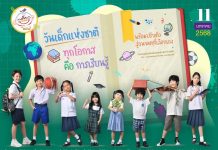Fun and meaningful efforts to enhance life skills for Thai youth through the power of sports and play
If we are to ask children what they enjoy doing the most, there can be many answers surfacing from this one simple question – like listening to a fairytale from their parents or spending time playing sports with their friends. We once were children and had, more or less, been engaged in different types of fun games. Play is a significant element that immensely contributes to youth development and growth. It also serves valuable purpose and a means by which children foster their physical, intellectual, emotional, social, and moral capacities contributing to their holistic development.
The UN recognizes play as the right of every child. Play is not a luxury; it is a tool for education and health. It can bring entire communities together and inspire every individual. A game of football can teach children about tolerance and peace while a game of tag can teach about malaria. Play helps teach important life lessons and develop skills like co-operation, leadership and teamwork. Play provides a retreat from everyday hardships and brings joy and laughter, allowing children to be children.
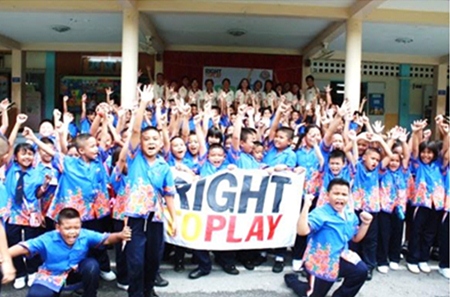 Students from Prayaprasert School, Bangkok participate in a play day reflecting the theme of teamwork and unity.
Students from Prayaprasert School, Bangkok participate in a play day reflecting the theme of teamwork and unity.
Established upon the philosophy that play has the transformative power to educate and empower children facing adversity, Right To Play was founded in 2000 by Johann Olav Koss, a four-time Olympic gold medalist and social entrepreneur. As a global organization, Right To Play is headquartered in Toronto, Canada, and operates in 20 countries, most of which are in less developed regions.
Through sports and games programs, we help children build essential life skills and better futures while driving social change in their communities with lasting impact. Right To Play advocates for Sport for Development and Peace as embodying the best values of sport, combining other non-sport components to enhance learning while also representing the notion that sport is now recognized as a key tool in the development and pursuit of peace, most notably within the Millennium Development Goals.
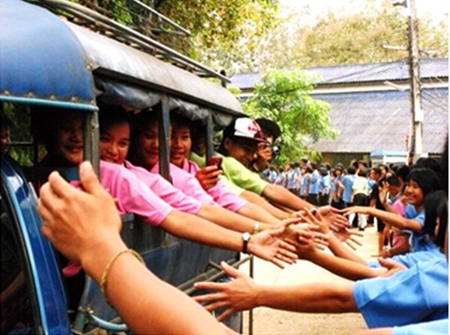 The power of sports and play has brought Thai and Burmese students to participate in the Friendship Games where the concept of appreciating the values of self and others is promoted.
The power of sports and play has brought Thai and Burmese students to participate in the Friendship Games where the concept of appreciating the values of self and others is promoted.
In Thailand, Right To Play began implementing programs in 2002 in response to the challenges faced by young people living in Thai- Burmese refugee camps. The Sport and Play Program for Burmese Refugees aimed to provide children and youth, who live in a volatile and uncertain environment, with the motivation to continue attending school despite the limitations of a refugee setting. Through dedicated local and international Right To Play staff many of whom with backgrounds in facilitation and sport for development, the program trains nursery and primary school teachers in Right To Play resources so that they may reach children in the formal education system. Results observed to date include: lower instances of conflict in schools, higher levels of student attendance and greater use of child-centered teaching practices by educators.
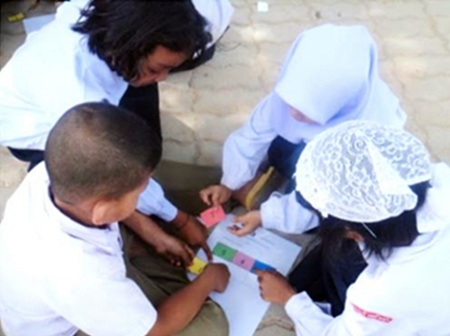 Through the child-centered learning approach, students reflect key life skills including teamwork and problem solving.
Through the child-centered learning approach, students reflect key life skills including teamwork and problem solving.
The tsunami that ravaged southern Thailand in 2004 was the impetus for an expansion of Right To Play’s programming to extend its sphere of influence and commitment to the values of sports and play in Thailand. Right To Play began this educational program in 2006 shortly after the natural tragedy with its Response to Tsunami Affected Communities in the southern provinces of Phuket, Trang and Krabi. This program later evolved into P’Learn: Learn National Education Program that expanded to Bangkok and Tak provinces.
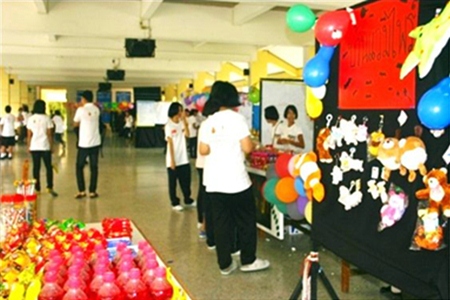 To promote the holistic development of children, Right To Play values the concept of youth empowerment where they are given the opportunity to make their own decisions in the design of school activities and projects.
To promote the holistic development of children, Right To Play values the concept of youth empowerment where they are given the opportunity to make their own decisions in the design of school activities and projects.
In 2007, Right To Play Thailand Foundation was registered as a legitimate entity with the Thai government continuing to implement programs using sport and play-based activities as an innovative and dynamic learning tool within a comprehensive and holistic approach to children and youth education and development. Right To Play Thailand Foundation has developed and implemented activity-based learning programs associated with developing life skills through a learner centered and experiential learning model in partnership with Office of the Basic Education Commission (OBEC), Ministry of Education. Under the Life Skills Development Program, Right To Play is reaching 38 schools in Trang, Satun, Songkla, Phuket, Bangkok and Nakhon Sawan and engaging more than 400 teachers and 10,000 students through regular classroom activities and special events.
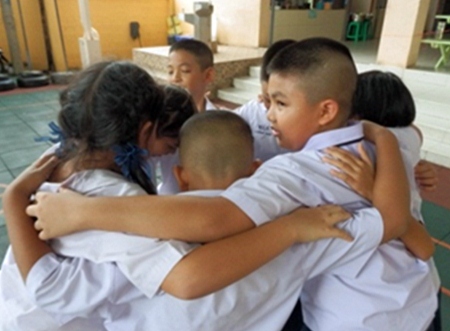 Life skills development activity by Right To Play has been integrated in classroom teaching to create a fun yet meaningful learning experience for the students.
Life skills development activity by Right To Play has been integrated in classroom teaching to create a fun yet meaningful learning experience for the students.
A key aspect of Right To Play’s innovative methodology is the use of the Experiential Learning Method developed by David Kolbe, an American Educator. Right To Play uses a 3 step teaching and learning strategy called Reflect-Connect-Apply (RCA) that guides learners through a simple three-step process. Through RCA, learners reflect what they have learned from the play based activities, connect the learning with their past experience and apply the learning for future use. This model has also been endorsed by Office of the Basic Education Commission (OBEC), Ministry of Education to mobilize the national curriculum with the concept of life skills development and positive behavior change as part of the key quality of the students.
In addition to school-based programming, Right To Play, with its in-depth level of implementation, also works with the Department of Juvenile Observation and Protection, Ministry of Justice, running sports and play program for more than 500 juvenile delinquents most of whom have been charged with drug use and possession, and theft, in 4 Youth Rehabilitation Centers in Trang, Samut Prakarn and Nakhon Pathom. A large number of them are from separated families and live with a single parent. Most juveniles reported that they committed the offence because of peer group influence. Economic pressures create problematic situations in the family and these situations impact family relations.
Through workshops, onsite coaching and supervision by devoted Right To Play staff, the youth center staff and volunteers learn to develop skills to improve their relationship with youth and their approach to rehabilitation services. They implement adapted Right To Play modules that promote the intellectual, physical, emotional, and social development in youth through team building and leadership skill building activities.
One of Right To Play’s underlying principles is to create sustainability in which we train local people, communities, teachers, and volunteers to run our programs building their capacity so one day they can be implemented independently from us. Right To Play work with communities, schools, and other international NGOs to understand specific challenges they face and tailor programs to meet their needs whether including livelihoods, financial literacy, peace promotion, conflict resolution or even hygiene through the mechanism of sport and play.
In 2013, Right To Play Thailand Foundation has entered into a partnership with MasterCard Worldwide to run the Financial Fitness and Livelihoods Learning Program which aims to work with 400 students from Nakhon Sawan Province and 100 youth from Sirindhorn Juvenile Vocational Training Center to enhance their life skills, increase their financial literacy and their entrepreneurial skills.
This is an extension to the existing Financial Fitness program in collaboration with MasterCard, which was launched in 2012. Seeking to provide youth with skills and knowledge in financial management and literacy, Right To Play and MasterCard have thus far hosted two Financial Fitness week-long summer camps in Bangkok. The camps saw participation from 500 Thai youths, empowering them with essential financial skills related to decision making, responsibility and negotiation.
All these learning programs with the children and youth are guided by Right To Play’s mission to use sport and play to educate and empower children and youth to overcome the effects of poverty, conflict, and disease in disadvantaged communities. Everyone at Right To Play believes that “When Children Play, The World Wins”.



